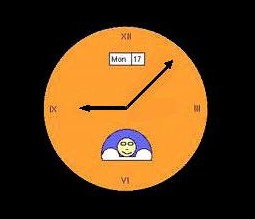
COCO 2
COURSE INFORMATION
SYLLABUS
READING GUIDE
PHOTO ALBUM
LAHR NOTES
PASTOR NOTES
POST A QUESTION
FRIDAY DISCUSSIONS
|


 1
2
3
4
5
1
2
3
4
5

A Workshop on Death and the Compass By Jorge Luis Borges July 30, 1998 Dwight Lahr
Zeno is mentioned at the end of Borges's detective story Death and the Compass. So, before beginning a discussion of the story, we had better be sure that we all know what Zeno was up to.
Zeno's Achilles Paradox Zeno was a Greek philosopher who lived in the fifth century B.C. He gave metaphysical arguments that motion is impossible. He seems to have wanted to demonstrate that unquestionably correct reasoning can lead to obvious absurdities. In this he succeeded, for the paradoxes were deeply troubling to rational thinkers. They could not be put in the category of mere word-play and discounted. In fact, the paradoxes remained unresolved for many centuries and troubled people throughout the world. It was not until the time of Galileo in the seventeenth century that a systematic unraveling of the paradoxes began. Bertrand Russell remarked in 1914 that "the arguments of Zeno, in one form or another, afforded grounds for almost all the theories of space, time and infinity, which have been constructed from his day down to our own." Zeno actually stated four paradoxes about the nature of space and time. Two attack the idea that they are discrete, and two the idea that they are continuous. Because they are related to the reference to Zeno in the Borges story, we will discuss here two formulations of the Achilles paradox attacking the infinite divisibility of space and time. This supposedly is what Zeno said: "Achilles cannot overtake a fleeing tortoise because in the interval of time that he takes to get where the tortoise was, it can move away. But even if it should wait for him, Achilles must first reach the halfway mark between them and he cannot do this unless he first reaches the halfway mark to that mark, and so on indefinitely. Against such an infinite conceptual regression, he cannot even make a start, and so motion is impossible." Now, we will present two formulations of Zeno's original paradox that Achilles could not overtake the tortoise. In each case, we will first give the formulation, and then we will list some questions and comments to guide our thinking about the issues that the paradox addresses.
|